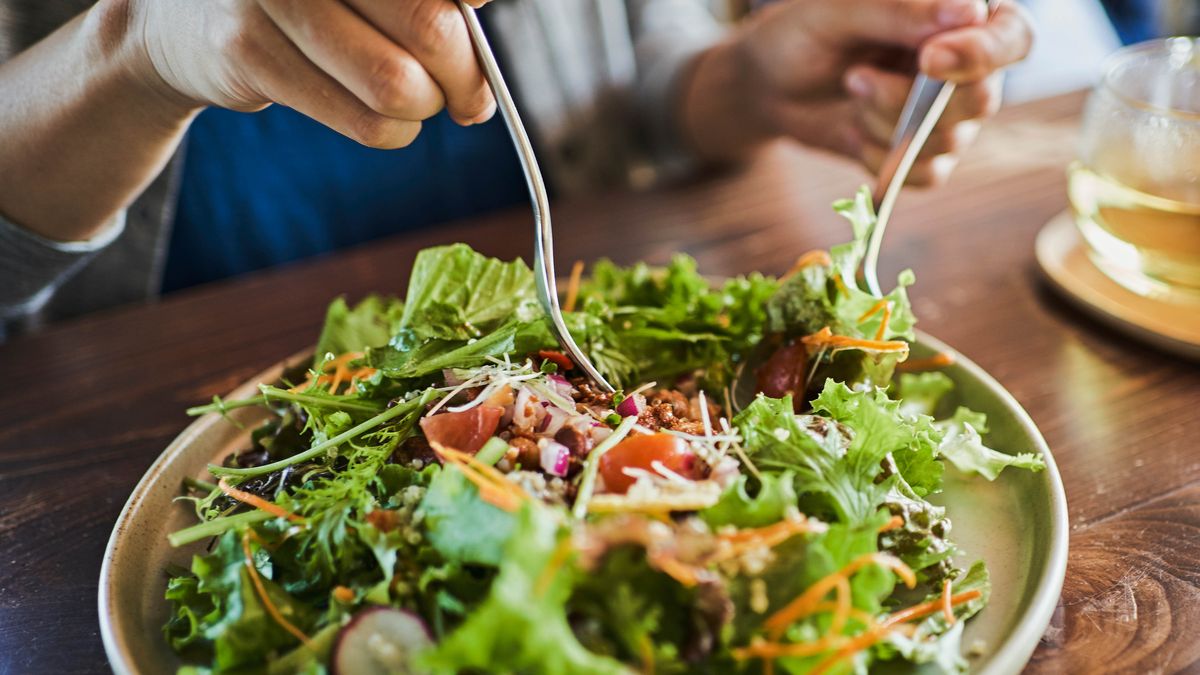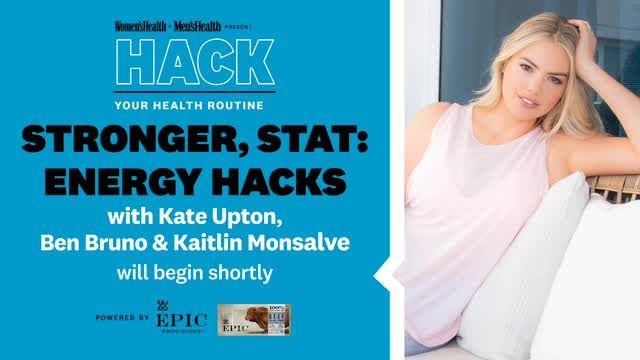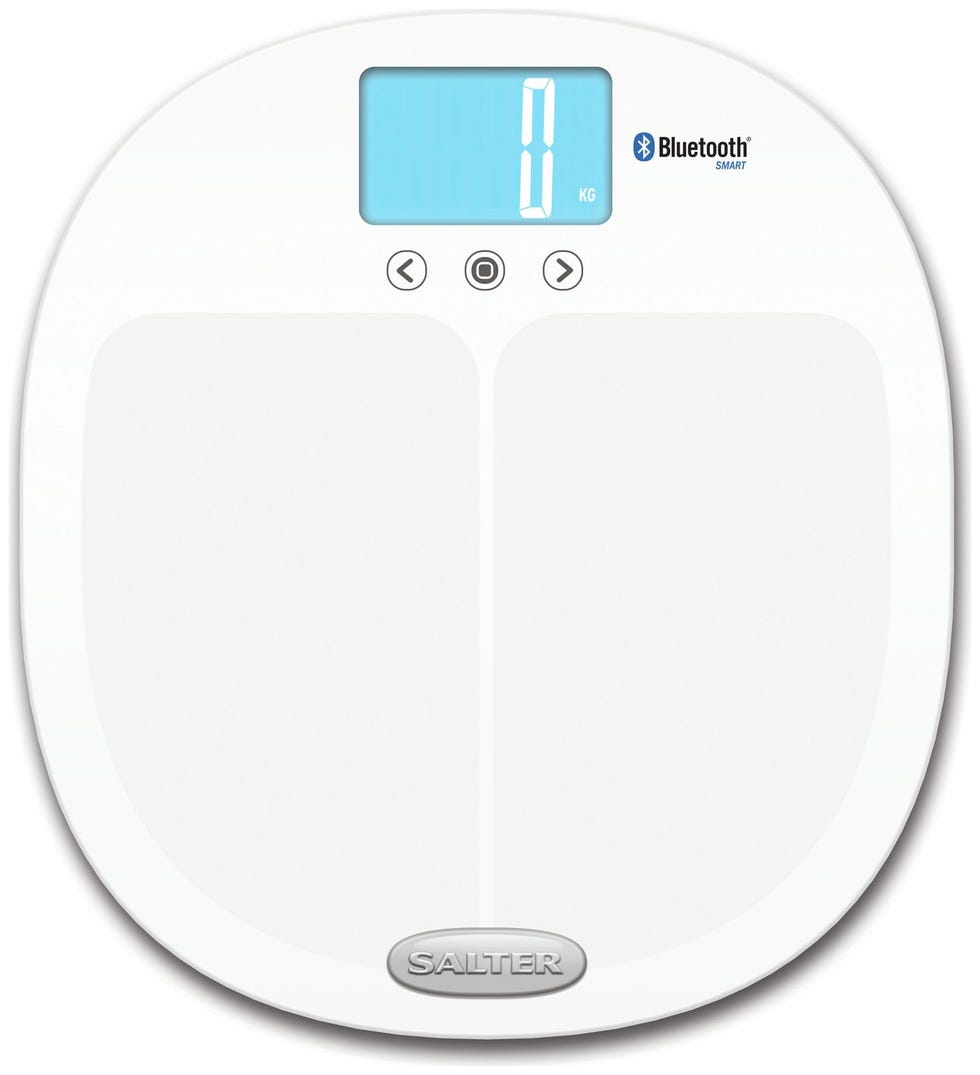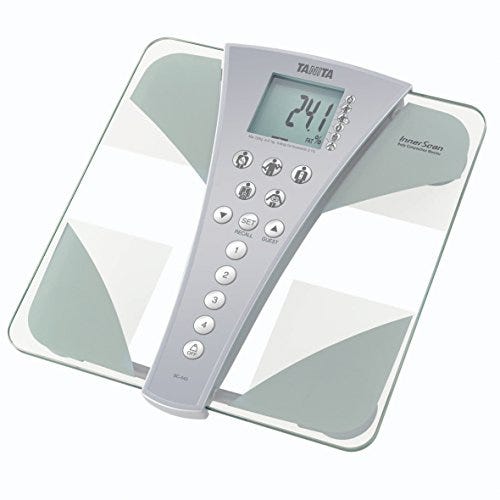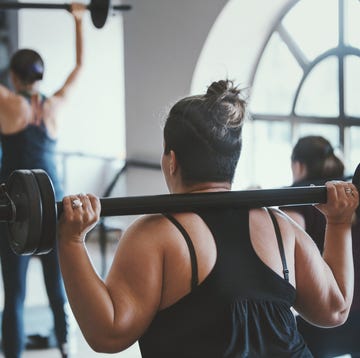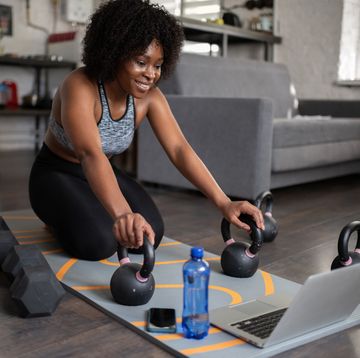Straight up, trying to lose weight fast (for whatever reason) isn't the safest or smartest way to go about changing your body composition. From crash dieting to cutting out entire food groups, the internet is choc-full of quick (but unsustainable) ways to achieve quick weight loss.
Depending on how you go about it, sensible or silly, your likelihood of maintaining or sustaining any sort of weight loss will be very different. Also, the type of weight you lose will be different. (Take this as your sign to stop searching 'how can I lose weight fast', it's probably not what you want at all.)
Drastically cutting calories and depriving your body of essential minerals and vitamins can result in a lower number on the scale but you might not actually lose body fat – which is what most people really mean when they say they want to know how to lose weight quickly.
However, there are ways to lose weight well and efficiently – from eating enough to setting realistic goals, we rounded up the best expert tips to keep your fat loss journey on track in a safe, sustainable way.
Quick one: the following tips are for those with excess weight to lose. If you're already at a healthy weight, trying to lose weight fast - or at all - is not advised. The team at WH want to empower women with the tools to build a healthy body for life. Before beginning any weight loss program please consult your GP.
1. Be realistic about timelines
There's trying to lose weight fast and there's losing weight for good, efficiently. A nuanced difference but a difference nonetheless.
As a rule of thumb (according to the experts and recent NHS guidance) safe weight loss is around 0.5 to 2 pounds per week, although this can change depending on how much you have to lose. The more you have, the quicker your initial rate of weight loss is likely to be although this will slow eventually.
Losing weight more quickly than this for a prolonged period of time can result in:
- Malnutrition
- Gallstones
- Lethargy
- Damage to your metabolism
One thing to remember, due to hormone fluctuations and other bodily processes, your rate of weight loss might not be the same every week.
'It's not a linear process,' explains personal trainer Dan Lambert of Maximuscle. 'Some weeks may be higher and some may be lower. To avoid losing motivation, asses your average weekly weight loss across a four-week period, instead.'
2. Plan your fitness around your life
We've all been there, a new routine, a fresh dose of willpower and suddenly there's nothing holding us back from our goals.
Then real life comes knocking, in the form of work, friends, family and stress and the motivation train has been and gone quicker than you can say #dedicated.
One way to buffer against flash-in-the-pan commitment is to take an honest look at your schedule and see where you can add workouts without throwing your entire life out the window.
'We have a much greater chance of sustaining a routine if we make sure the time we're allocating to it suits our lifestyle,' says Lambert. 'Try three to four 45 minute gym workouts a week rather than 90-minute workouts five to six days a week.
'While the less time-intensive routine may burn fewer calories, you're much more likely to stick to adhere to it for the long term.'
Because (as unsexy as it is) consistent effort over a sustained period of time is where the real results come from – something it can be easy to forget when trying to lose weight fast.
3. Swerve overreaching
While we're all about setting big goals (and smashing them out of the park), there is such a thing as doing too much. And that goes double for your fitness and weight loss.
'Overtraining occurs when a person exceeds their body's ability to recover from training,' says Lambert. 'This usually occurs when we try to adhere to a plan that's too advanced for us, or when we introduce training into a life already overloaded with stress, or when we're not managing other aspects of our health correctly, such as sleep and nutrition.'
When our bodies can't recover properly, a stress hormone called cortisol is released which can impact our ability to burn fat properly. 'This can actually lead to weight gain,' says Lambert. 'Chronic overtraining may also lead to illness and possibly injury, which puts a halt on our fat loss goals altogether.'
To recap: go ahead and set the big goals but make sure to break them down into manageable, realistic, chunks that keep you and your body at optimal stress levels.
4. Make strength training a priority
Building muscle with regular strength training and resistance training has myriad benefits, one of which is, unsurprisingly, building lean muscle tissue. The more muscle you have, the more energy (and calories) your body has to spend maintaining it.
'Strength training builds muscle which increases your body's resting metabolic rate and daily calorie expenditure,' explains Lambert. 'Focus on building strength and muscle and lifting with intensity.'
- This strength training for beginners plan is a great place to start
- Alice Liveing's 28-day plan will help you get to grips with basic resistance training movements and good technique
- Looking for a ready-made gym workout? Look no further.
5. Don't forget about cardio
Now that we're clear on why strength training is so damn good for fat loss, we gotta get straight on why you shouldn't skimp on cardio either. Besides the cardiovascular (heart) benefits, regular sweaty sessions can help with improving blood pressure, increasing stamina and keeping your mind clear.
Minute-for-minute, cardio burns more calories than strength training (but the best fitness routines incorporate both), and there are so many types to choose from: swimming, running, cycling, dance workouts, HIIT, the list goes on.
Keep your heart in peak condition with cardio and your muscles challenged with strength training and you'll be on the path to success in no time.
Psst, this four-week run plan will get you running for 30 minutes non-stop.
6. Remember to get your NEAT in
No, we're not talking about remembering to make your bed. NEAT stands for non-exercise activity thermogenesis and refers to everything that isn't demarcated exercise. Think walking up or downstairs, doing household chores, playing with your kids and even fidgeting.
Somewhat surprisingly, NEAT exercise makes up a very large part of your total daily energy expenditure (how many calories you burn per day) – much more so than the 30 - 60 minutes you spend on your home or gym workout. Making sure you have enough NEAT in your weekly activity is a key part of maintaining a healthy calorie deficit, crucial if you're trying to lose body fat.
Get clued up on everything you need to know about NEAT exercise and its benefits, as well as easy ways to improve your daily NEAT levels.
7. Get clever about measurements
Stepping on the bathroom scale every morning might not be the best way to stick to a healthy weight loss regime, especially if you find the number impacts your mental or emotional state negatively. In fact, if you're trying to lose weight fast, keeping a beady eye on your weight might actually be misleading.
From menstrual cycle changes to water retention, the number of variables that affect how much you weigh is numerous. Instead, monitoring your body fat percentage using callipers or smart scales could be the key to a more balanced and less volatile experience.
And, even if weight loss is your number one priority, measuring other metrics can be just as rewarding – from your sleep quality to daily demeanour, how much energy you have, feeling stronger or having more stamina.
8. Recovering properly is essential to lose weight fast
Word to the wise, without proper recovery you're selling yourself and your potential results short. Because if you're not making it a priority, you're most likely compromising in other areas of your life too. For example, without adequate R&R your body can't repair properly which means you won't be able to lift as heavy or well or run as far or fast.
'You have to let your body heal from the work you’ve been doing all week. Your muscles need a chance to desensitise and get used to the progression you’ve already made. If you push your brain too hard at work, you burn out. It’s the same with your body,' Barry's Bootcamp trainer, Jemma McKenzie-Brown previously explained to WH.
And she's not wrong. Taking a rest day isn't just to recover, it's also to prepare for what's to come next – mentally and physically.
Not to mention, you'll most likely also be skimping on the things that make life sweet – seeing friends, getting enough sleep, or having a day away from the gym.
'For a fat loss programme to be sustained, it must be enjoyable, simple and relatively easy to follow without interfering with the aspect of your life that mean a lot to you,' says Lambert.
Remember, we're trying to change your body composition for the long term – not just for the moment. You can take a day off, trust us.
9. Eat enough
We're going to level with you – under-eating (eating fewer calories than your body requires) will result in weight loss. But, it'll be short term. When you return to regular eating patterns or go back to eating how much your body needs to survive, you'll most likely gain the weight back and more. Not ideal.
'Most people end up getting fed up and not sticking to these [crash] diets as they're not sustainable,' says registered dietician, Tai Ibitoye, adding that almost everyone 'regains weight once they've stopped these diets.'
Instead, learning what your body and routine need to lose fat, prioritising nutrient-dense, filling food and being mindful of portion sizes will take you further than any unhealthy and unsustainable restrictive diet ever will. Promise.
'Aim to eat three regular, balanced meals throughout the day and avoid skipping meals as you could miss out on important nutrients and end up snacking more as you feel more hungry,' says Ibitoye. '
Clue up on exactly how many calories your body needs and where to get them from with our handy macro calculator.
10. Double down on fibre
Not only does fibre help with keeping digestion regular, but it'll also keep you feeling full for longer. When satiation is the name of the game that's never a bad thing.
Ibitoye suggests adding more of these fibre-rich foods into your diet:
- Fruit
- Vegetables
- Oats
- Whole-grain pitta bread
- Brown rice and pasta
- Beans
- Peas
- Lentils
11. Consider cutting down on the sauce
Not mayo but alcohol. Not only can the sugar spike your blood sugar (which can cause your body to store more fat from food), the need-to-eat-everything mood that comes after a night of drinking could undermine your good efforts the rest of the time.
'One gram of alcohol provides 7 calories compared with 4 calories per gram for carbohydrates and protein,' says Ibitoye. 'Try to have several alcohol-free days during the week and opt for non-alcoholic drinks or low-alcohol drinks instead.'
And, if you are hungover, the science says to swerve your workout. Not only are you dehydrated (which exercise will exacerbate), your risk of injury is much higher too.
12. Make H20 your new best mate
Short story: drink water. Long story: drink water.
'Aim to stay hydrated throughout the day by drinking two litres of fluids – you may need more if exercising, sweating or have high temperature,' says Ibitoye.
Drinking enough water helps to keep your body ticking over, can prevent headaches and plays a vital part in healthy digestion. Whether you like to tote around a reusable water bottle or run with a running water bottle drinking more water doesn't need to be arduous. In fact, setting small goals, like drinking a litre of water before lunch can help keep you on track.
If slugging a straight glass isn't your vibe, getting around foods with high water content (soups, fruits and veggies) can help get you to hit your goal too.
13. Snack mindfully
Love a snack? Yeah, us too. However, those constant grazings and "little" handfuls can take us beyond what we need to hit our goals.
Ibitoye suggests keeping them to a mindful portion – what you need to feel satiated but not stuffed – and opting for healthy snacks, such as:
- Fruit pots
- Sliced fruits with nut butter
- Vegetable sticks with low-fat hummus
- Plain or lightly salted popcorn
- A handful of nuts
- Low-fat yoghurt
- Plain crackers
- Oatcakes
(Um, delicious?)
14. Don't forget about sleep
Eight hours of good quality, restorative sleep? We love to see it! And, it's not just us. Your body does too, especially if you're trying to lose weight.
'Some studies have found that sleep deprivation is associated with increased ghrelin levels – also known as "the hunger hormone" – and increased food intake,' says Ibitoye. And while this particular area of nutritional science needs more research, general NHS guidelines recommend between six and nine hours of sleep every night for adults.
Get your Z's. Doctor's orders.
15. Manage stress
If you've ever mainlined chocolate digestives after a particularly aggravating day at work, you'll know that stress can play a huge role in your appetite, cravings and weight loss efforts.
'It's important to find good coping mechanisms to keep your stress at bay,' advises Ibitoye. 'This can look different for different people – from finding time to rest, learning relaxation techniques, using meditation apps like Calm or Headspace, speaking to a loved one, journaling or speaking to a health professional for advice and support.'
16. Think about the bigger picture
To lose weight fast or otherwise, your body needs to feel safe and healthy enough to do so. And, without proper stress management, sleep, recovery, exercise and nutrition, it's probably not going to feel in a place to do so.
Keep an eye on the whole picture and don't grow disheartened if it's not happening as quickly as you'd like – sustainable, safe weight loss is always better than a quick-fix.

